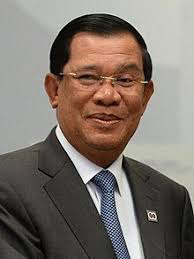PHNOM PENH, (Reuters) – Cambodia woke to another chapter of rule by strongman Prime Minister Hun Sen yesterday, a day after his Cambodian People’s Party (CPP) declared victory in a general election that rights groups said was neither free nor fair.
The White House said it would consider steps, including an expansion of visa restrictions placed on some Cambodian government members, in response to “flawed elections” in which there was no significant challenger to Hun Sen.
CPP spokesman Sok Eysan said on Sunday the party won an estimated 100 out of 125 parliamentary seats. The DAP news, a pro-government website, said later the CPP had won 114 seats. Two other parties, the royalist Funcinpec party and the League for Democracy Party, won five and six seats respectively.
More than 82 percent of those registered to vote cast a ballot, according to the National Election Commission. Turnout was 90 percent in the 2017 local election and 69.61 percent in the previous general election in 2013.
Critics say the election was a backward step for democracy in Cambodia following the dissolution last year of the main opposition Cambodian National Rescue Party (CNRP) and the jailing of its leader, Kem Sokha, on treason charges.
Former CNRP president Sam Rainsy, who lives in exile, said the election was a “hollow” victory for Hun Sen, a former Khmer Rouge commander who has ruled Cambodia for nearly 33 years.
The United States has imposed visa curbs on some Cambodian government members over a crackdown on critics and levied sanctions in June on a high-ranking official close to Hun Sen.
The European Union has threatened Cambodia with economic sanctions. White House Press Secretary Sarah Sanders said in a statement Sunday’s vote “failed to represent the will of the Cambodian people”.
“The flawed elections, which excluded the country’s principal opposition party, represents the most significant setback yet to the democratic system enshrined in Cambodia’s constitution,” Sanders said, adding that the election campaign was marred by threats from national and local leaders.
“The United States will consider additional steps to respond to the elections and other recent setbacks to democracy and human rights in Cambodia, including a significant expansion of the visa restrictions announced on December 6, 2017,” she said.
Government spokesman Phay Siphan said the White House statement was an attempt to intimidate Cambodia.
“This is against the Cambodians who went to vote to decide their own fate,” Phay Siphan told Reuters.
Newspaper headlines in Cambodia on Monday greeted Hun Sen’s victory.
“CPP Dominates Election: Unofficial results show ruling party will increase its majority in the National Assembly,” said the pro-government Khmer Times newspaper.
Some independent media were targeted by Hun Sen and his allies in a pre-election crackdown.
Many polling stations in the centre of the capital, Phnom Penh, appeared quiet on Sunday. Polling stations Reuters visited in the city were less than bustling and some voters said they voted because not doing so would land them in trouble.
The opposition CNRP had called on voters to boycott the election but authorities warned anyone doing so would be seen as a traitor.
At the Kapkor Market in Phnom Penh, Meas Sinuon, 60, said she was pleased with Sunday’s result.
“This government has done good things already,” she said as she shopped for groceries. “But I want the new government to do more to help the people.”
Another voter, a Phnom Penh tuk-tuk driver, described the result as “same same”.
“Hun Sen again,” said the man, who declined to be named because he feared for his safety.
Unofficial election results are expected in mid-August, with official results due in September.










